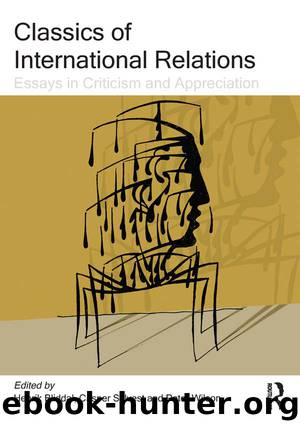Classics of International Relations by Bliddal Henrik

Author:Bliddal, Henrik.
Language: eng
Format: epub
ISBN: 9781135018658
Publisher: Taylor & Francis (CAM)
14
Probing the institutional fabric of world politics: Hedley Bull's The Anarchical Society
Andrew Hurrell
Hedley Bull frequently used the term ‘classical’ in his own lectures and writings. The term, he said, did not refer to a particular period but should rather be understood in the sense proposed by Matthew Arnold, namely the degree to which a work provided ‘most excellent exposition’ of a particular issue or of an enduring question.1 The status of The Anarchical Society as a classic text in this sense is clear. It provides the most systematic and powerful exposition of the view that together states form an international society, and it develops this idea as a powerful vantage point from which to analyse and assess the possibilities of order in world politics. At the core of the book is the question: to what extent does the inherited political framework provided by the society of sovereign states continue to provide an adequate basis for order? The Anarchical Society does not seek to provide a purely descriptive or narrative account of international events or developments, nor is it directly concerned with the explanation of international relations. Rather, it provides an interpretation of how international relations have changed and how those changes should be evaluated from the perspective of a particular set of values, above all the pursuit of order.2
Bull's concern with order and institutions would seem to connect with the debates on multilateralism, international institutions and global governance that have been so prominent during the period since the end of the Cold War. But Bull's focus is less on explaining particular institutions and more on assessing and evaluating the overall character of institutionalization in world politics, the normative commitments inherent in different ways of governing the globe, and the adequacy of existing institutions for meeting practical and normative challenges. The Anarchical Society remains a fundamental teaching text. It is one of the most important and most-cited works of the so-called English School of International Relations.3 Its pedagogical value rests on the quality of Bull's writing and analysis – its intellectual rigour, its clarity of exposition, and its capacity to unsettle established and comfortable positions.
The first section of this chapter will elaborate this claim in more detail and provide a brief overview of the main arguments of the book. The following section will consider two other ways in which the book can be said to be a classical text: as emerging from, and taking forward, a set of ‘classical traditions’ of thought on international relations, and as representing a ‘classical approach’ to how international relations should be studied. The third section explores some of the major criticisms of the book. The final section examines the book's contemporary relevance and considers the charge of out-datedness.
Download
This site does not store any files on its server. We only index and link to content provided by other sites. Please contact the content providers to delete copyright contents if any and email us, we'll remove relevant links or contents immediately.
The Secret History by Donna Tartt(19085)
The Social Justice Warrior Handbook by Lisa De Pasquale(12190)
Thirteen Reasons Why by Jay Asher(8907)
This Is How You Lose Her by Junot Diaz(6885)
Weapons of Math Destruction by Cathy O'Neil(6279)
Zero to One by Peter Thiel(5801)
Beartown by Fredrik Backman(5751)
The Myth of the Strong Leader by Archie Brown(5507)
The Fire Next Time by James Baldwin(5442)
How Democracies Die by Steven Levitsky & Daniel Ziblatt(5218)
Promise Me, Dad by Joe Biden(5153)
Stone's Rules by Roger Stone(5087)
A Higher Loyalty: Truth, Lies, and Leadership by James Comey(4960)
100 Deadly Skills by Clint Emerson(4924)
Rise and Kill First by Ronen Bergman(4788)
Secrecy World by Jake Bernstein(4752)
The David Icke Guide to the Global Conspiracy (and how to end it) by David Icke(4717)
The Farm by Tom Rob Smith(4507)
The Doomsday Machine by Daniel Ellsberg(4490)
